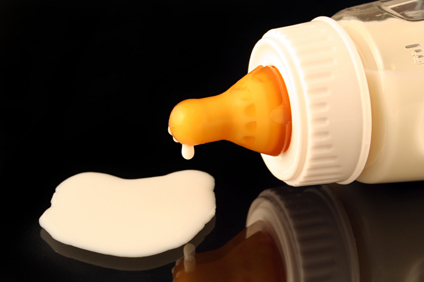It’s an exquisitely calibrated feedback system of supply and demand. Regularly challenge the organ by removing the amount needed and the organ makes more.
But what if the organ doesn’t make enough? Will the amount produced increase if we challenge the organ more frequently?
Think I’m talking about the breast and pumping? I’m not. I’m talking about the pancreas and classic, juvenile onset (type I) diabetes.
Diabetes (type I) is characterized by a failure of the pancreas to produce the amount of insulin needed. Although blood sugar regulation is meant to be an exquisitely calibrated system of supply and demand, with more insulin produced and released when the body faces a large sugar challenge, it doesn’t work that way in classic diabetes. The pancreas can’t produce more insulin regardless of the stimulus and ingesting ever larger amounts of sugar won’t stimulate the pancreas to produce more insulin; it will simply result in diabetic coma.
Reflecting on the fact that the feedback system of insulin and blood sugar fails utterly in classic diabetes made me wonder whether it makes any sense to imagine that pumping will do anything to increase inadequate breastmilk supply. I can’t find any scientific evidence that it does.
What causes failure of lactogenesis? According to this paper by lactation consultant Nancy Hurst Recognizing and Treating Delayed or Failed Lactogenesis II:
Although actual rates of failed and delayed lactogenesis are unknown, estimates ranging from 5% to 15%, respectively, have been reported.
It’s not a rare problem; it’s a common one.
Delayed lactogenesis II denotes a longer than usual interval between the colostrum phase and copious milk production, but whereby the mother has the ability to achieve full lactation. Failed lactogenesis II is a condition wherein the mother is either able to achieve full lactation but an extrinsic factor has interfered with the process, or one or more factors results in failure to attain an adequate milk production. Failed lactogenesis can be described further in the context of two types of conditions: a primary inability to produce adequate milk volume, or a secondary condition as a result of improper breastfeeding management and/or infant-related problems.
When the problem is a result of improper breastfeeding technique or infant inability to suck properly, pumping can improve the problem because the underlying feedback system of supply and demand is intact. But what if the problem is a failure of the breast to produce enough milk? That failure can be caused by:
… anatomic breast abnormalities or hormonal aberrations. Insufficient mammary glandular tissue, postpartum hemorrhage with Sheehan syndrome, theca-lutein cyst, polycystic ovarian
syndrome, and some breast surgeries have been implicated as possible causes of lactation failure.
Hurst recommends the following treatment plan for both primary and secondary failure to produce adequate breastmilk:
A treatment plan for a delay or suspected lactation failure should include the following key elements: providing adequate infant nutrition, maximizing breast stimulation and complete breast emptying, strategies to measure milk intake during breastfeeding, … and recognition of when maternal lactation potential is reached.
Note that providing adequate infant nutrition is the FIRST step to any treatment plan. Hurst emphasizes that increasing the number of breastfeeding sessions is NOT going to solve the problem. Supplementation may be required.
Determining the need for supplementation is essential in promoting adequate infant growth and energy levels. An infant who is malnourished will not have the energy to breastfeed effectively; recommending that the mother simply increase the number of breastfeeds per day to improve her milk volume and the infant’s milk intake will not improve the situation when failed lactogenesis II is suspected.
How about pumping:
Mechanical breast pumping with an effective hospital-grade breast pump following each breastfeeding should be initiated whenever a delay or failed lactogenesis is suspected. This practice serves to increase breast stimulation and promote complete breast emptying.
That should help if the problem in related to breastfeeding technique or poor infant feeding, but what’s the evidence that pumping will improve output in women with primary failure of lactogenesis?
There is no evidence that pumping improves breastmilk supply in primary failure of lactogenesis. No only is there no scientific evidence to support the recommendation of pumping, as far as I can determine, no one has even studied the issue. If anyone else is aware of any evidence, please share it.
Yes, pumping increases supply in women who have an intact hormonal feedback system of supply and demand. But if the problem is failure of supply, why would demanding more have any impact at all? It is unreasonable (and deadly) to imagine that feeding ever larger amount of sugar to a diabetic will stimulate insulin production. It seems unreasonable (and potentially deadly for an infant) to imagine that pumping more and longer is going to stimulate breastmilk production.
Last week I noted that telling a new mother to breastfeed AND pump is barbaric. I pointed out that the key to a health, happy, thriving infant is a physically and emotionally healthy mother. That means a mother who is getting enough rest, whose mental health needs are being addressed, and who is able to enjoy substantial amounts of time happily bonding with her child. Breastmilk is not necessary, not necessarily best for every mother-infant dyad, and the effort to produce it is positively harmful in some situations.
So lactation consultants telling new mother with primary lactogenesis to pump in addition to breastfeeding is not only barbaric, but also completely ineffective.
Way to go, lactation consultants.


